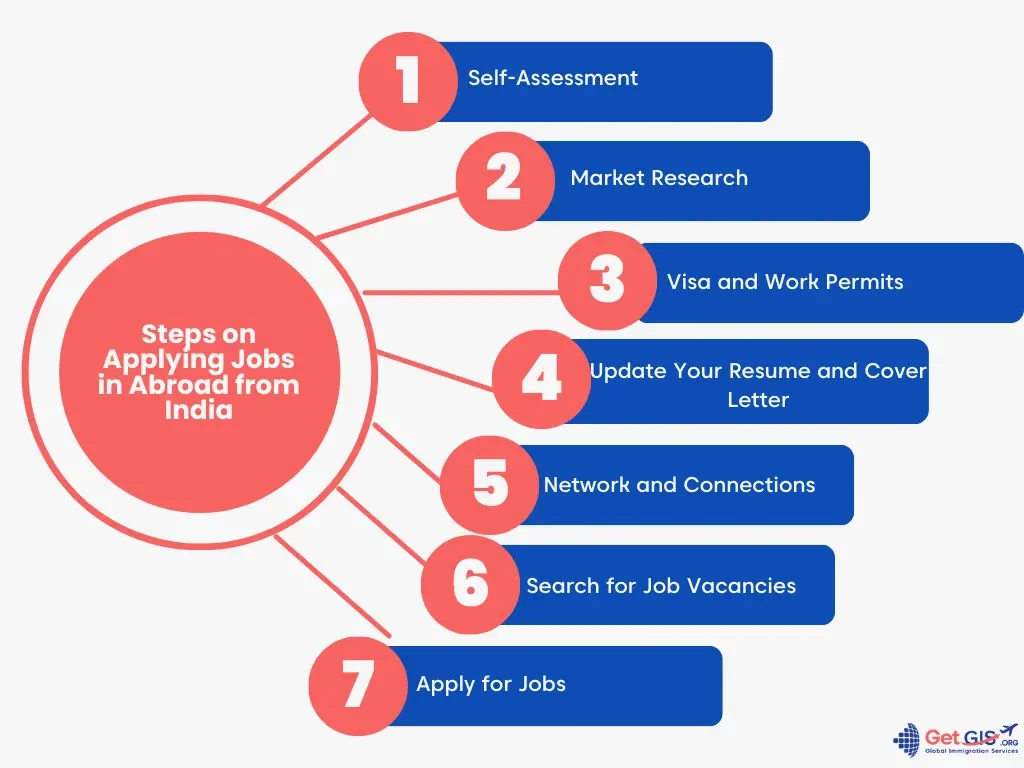Unlocking Opportunities: How to Get a Job Abroad
Table of Contents

- jaro education
- 2, April 2024
- 2:00 pm
Why to Work Abroad?
In an era of globalization, the prospect of working abroad has become an enticing opportunity for many individuals seeking to broaden their horizons and enhance their careers.
The Indian population is across the globe and one of the reasons behind it is their aim to settle abroad due to multiple factors. It includes exposure to diverse cultures, the opportunity to expand professional networks globally and to experience and enhance different lifestyles. It provides a platform to individuals for personal growth, promoting adaptability and resilience in the face of new challenges. Additionally, international work experiences promote a broader range of career opportunities, adding value to one’s professional repertoire.
Key Areas to Consider to Find How to get a job abroad
Section 1: Exploring Opportunities
1.1 Define Goals and Preferences
Identifying the goals & the reasons behind it is crucial before approaching the job search abroad. This is key for those who are looking to work abroad and searching externally. Moreover, personal preferences & professional requirements are crucial as well in terms of consideration. This will give clarity on factors such as the type of work you want to engage in, your preferred location, and the cultural environment you thrive in. Understanding these aspects will guide your job search and help you find the right fit.
1.2 Explore In-Demand Industries, Occupations & Locations
The most important area to consider while looking to work abroad is the in-demand and preferred industry, field of work and location. Conduct proper research into the global job market to identify which locations to target according to the skill, industry and field of work. Platforms like LinkedIn, Glassdoor, Indeed, etc. provide valuable insights into international job trends and openings. Remember, each country has its own job market dynamics, cultural nuances, and visa regulations. Then, narrow down your options by researching potential countries that align with your career goals. Evaluate factors such as economic stability, job opportunities, and the ease of obtaining work visas.
Section 2: Organizing Necessary Documents
2.1 Designing Resume and Cover Letter
Here, the portfolio of the professional is crucial in attracting job opportunities abroad. So, craft a resume and cover letter that aligns with international standards which includes highlighting your relevant skills, experiences, and achievements. In order to match the expectations of employers in the country you’re applying to, it is important to tailor your portfolio as per the need.
2.2 Building Online Presence
Networking has become a very important aspect in all aspects of a professional. It helps to achieve career growth and development. More importantly, to work abroad, networking really helps in building a strong online presence. LinkedIn is one of the important platforms for increasing online presence professionally. Connecting with the right people is the key to having a robust online presence.
2.3 Arrange Necessary Certifications
Working abroad or finding a job overseas is not as easy as it seems. Some countries may require specific certifications or qualifications for certain professions. Doing proper research about the requirements for your desired location and ensuring you have the necessary credentials is the key. This may involve obtaining language proficiency certifications or industry-specific qualifications. There are a few Edtech companies that provide in-demand certifications in collaboration with top institutes across the globe. For instance, Jaro Education. Apart from the certificate, the professionals get a different perspective from the faculty and practical learning which helps them to showcase their skills whenever required.
Section 3: Understanding Visa Regulations
3.1 Research Visa Requirements
Understanding the visa requirements of your target country is essential. Collecting information about the different types of work visas available and the eligibility criteria for each is crucial to figuring out the further process. Ensure that you meet all the necessary requirements before initiating the application process.
3.2 Seek Sponsorship from Employer
This option is for those who are either working in a multinational company or in a company which is looking to expand on a global level. In many cases, employers sponsor work visas for their international hires. So, an employee can target to achieve the designation where he will be in consideration for the visa application process and working abroad.
3.3 Guidance from Immigration Experts
Navigating visa processes can be complex. Here, the role of Immigration experts is crucial in terms of guiding the professionals. They can provide valuable insights, assist with paperwork, and ensure compliance with local regulations.
Section 4: Job Search Strategies
4.1 Explore Online Job Portals
One of the primary ways to search for a job overseas is to utilize international job portals and websites. Websites like Monster, CareerBuilder, and Indeed have global job listings. Additionally, exploring country-specific job portals to find openings tailored to the target location should be considered by the individual.
4.2 Participate in Virtual Job Fairs
Virtual Job fairs not only give professionals a chance to showcase their skills but also grab a golden opportunity to work abroad. These events provide an opportunity to interact with employers, submit resumes, and attend informational sessions. Virtual job fairs have become increasingly popular and offer a convenient way to connect with international employers. To grab this kind of golden opportunity, individuals need to update themselves on this sort of event on a regular basis.
4.3 Utilize Remote Work Opportunities
There are a lot of employers from abroad looking to hire professionals with the skills needed to do the specific job. With the rise of remote work, especially after COVID-19, employers from different countries are considering hiring employees from any country. exploring opportunities that allow you to work remotely for an international company. This method can help a professional to build a strong relationship with the employer which in turn might help in relocating to the respective country.
4.4 Search for Vlogs on how to get a job abroad
Due to the advancement in ever-evolving technology, access to information has become easy. Now, professionals can easily go on YouTube to search for vlogs related to job opportunities abroad. It is the best way to get the required information and apply the same immediately.

*getgis.org
Section 5: Interview Strategies
5.1 Understand the interview requirements
Every country and employer has a different style of conducting an interview. So, understanding the requirements in each aspect will be the key to grabbing the opportunity to work abroad. It involves learning the cultural aspect apart from the professional aspect of the interview of the respective country which can help professionals to present themselves in a better way.
5.2 Conduct Mock Interviews
Mock interviews will prepare an individual more on a mental level in terms of boosting their confidence. Mock interviews become key in collecting the right knowledge and skills to present in front of the employer.
5.3 Follow-Up Strategy
This is one of the important aspects where an individual can strategize a good response from the employer and if selected a good approach for negotiation for compensation. One of the methods is following the right follow-up strategy: after the interview, send a thank-you email expressing your gratitude for the opportunity.
In case of selection, carefully review the compensation package and benefits. Consider factors such as the cost of living in the new country, relocation assistance, and health insurance. Based on these factors, the negotiation will be done.
Section 6: Finalizing the Relocation Process
6.1 Basics for relocation
Finally, the basics need to be followed to relocate to a different location. Once you have accepted a job offer, start planning your relocation. Consider logistics such as housing, transportation, and settling-in assistance. Create a checklist to ensure a smooth transition to your new work environment.
6.2 Managing cultural differences
The preparation has to be done when approaching to work abroad. Once the professional understands how the culture in one specific country works, then it is important to prepare in adapting that culture. Understanding and respecting the cultural nuances of your new workplace will help you integrate more seamlessly into the professional and social aspects of your life abroad.
6.3 Resilience is the key
Relocating for work can be both exciting and challenging. Be prepared for adjustments, and stay resilient in the face of cultural differences and new environments. Seek support from local expatriate communities and colleagues who can provide valuable insights and guidance.
Conclusion
In conclusion, this blog serves as an invaluable roadmap for professionals aspiring to work overseas. From defining goals and navigating visa processes to leveraging online platforms and participating in virtual job fairs, this guide provides a step-by-step approach to securing international employment. Emphasizing the importance of cultural adaptation and resilience, it equips readers with the essential tools to not only find a job abroad but also thrive in their new professional and cultural landscape. For those seeking to broaden their horizons and embark on a rewarding international career, this comprehensive guide is an indispensable resource.








